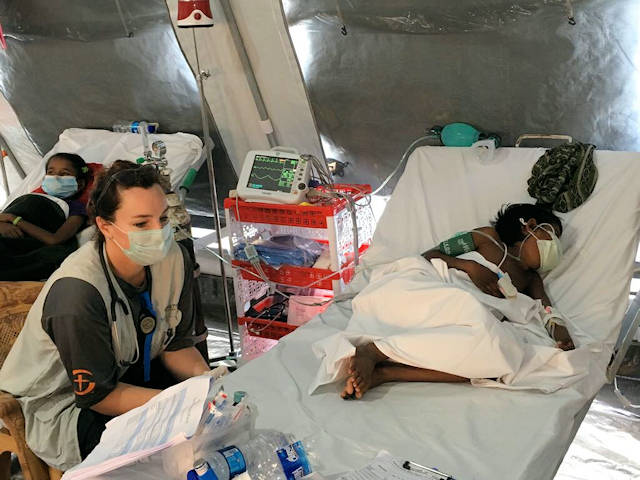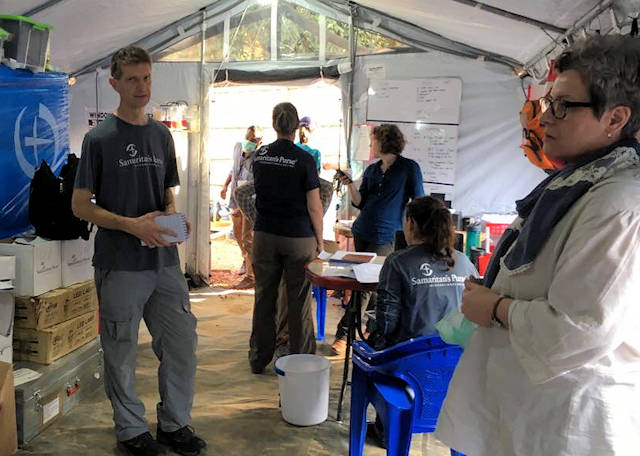
Norwich man reports from Rohingya refugee clinic
Norwich-based Disaster Assistance Response Team Eldred Willey reports direct from a Samaritan’s Purse emergency diphtheria clinic he has helped to set up over the past two weeks in Bangladesh to serve Rohingya refugees.
The Rohingya men were hard at work building Ward Five of the Samaritan's Purse diphtheria clinic. All around me they were splitting bamboo poles with machetes, erecting walls woven from leaves, and hauling gravel for French drains.
I greeted one man on my way to the triage area, and he paused from his task to tell me his story. Aziz (not his real name) used to be a shopkeeper in Rakhine State, Myanmar. One day police appeared at his shop, he claims, and demanded that he give them a large quantity of rice, without payment. He refused.
A few days later they returned and arrested him. Taking him to prison, they tied his hands behind his back and beat him with batons so badly that they nearly killed him, he recalled. He showed me the scar and the deformity on his pelvis where he said one of them had hit him with a brick.
Aziz told me a court accused him of burning down the houses of Buddhists, and sentenced him to three years in prison. In captivity he received barely enough rations to survive, and the guards used to beat his hands so badly that he was sometimes unable to eat.
Returning home on release, he immediately swept his children into his arms and, leaving everything, fled to Bangladesh with just the shirt on his back.
The stories about extra-judicial killings coming from Rohingya refugees are too consistent and too many to leave any room for doubt. Forty Rohingya labourers were having dinner at the site. Over the meal one of them said that his father had been a victim of the killings. Darrell Kelly, an American site supervisor, decided to ask the whole group how many had lost family members through killing. All but four men stood up.
Over the weeks, a mutual affection has grown between Darrell and the men. As the time for his departure approached, he began giving away possessions to his prize workers, finishing with his hat and his knife. At his farewell speech he told these Muslim men that Jesus loved them, and that this was why he had come. They responded with a round of applause. Who knows? With this quality of witness, perhaps the Rohingya too could be woven like bamboo leaves into a living temple where the Lord dwells.

Down in Ward One, Charge Nurse Kelly Sites was monitoring a child receiving Diphtheria Anti-toxin Treatment (DAT). It is a complicated and dangerous procedure lasting for several painful hours. Japanese and Bangladeshi medical teams, who do not have facilities to administer DAT, have decided to refer severe cases to Samaritans Purse. A group of NHS nurses from the UK were at the clinic learning how the procedure works.
It is extraordinary. Children who on arrival seem about to asphyxiate are next day playing in the adjacent ward. For the site manager Will King it seemed unbelievable.
“Man, I thought those kids were going to die,” he said.
“They were going to die,” responded a doctor.
“We are offering top-quality care,” said Sara Philipps, the Medical Director. “Our goal is that everyone who needs DAT gets DAT. We want to show that these people are valuable.”
Many of the medical team are veterans of the Samarians Purse Emergency Field Hospitals in Ecuador and Northern Iraq. Here in Bangladesh they are working 12-hour shifts with no days off. The aim over the next weeks is to treble the capacity of the acute ward.
As one Bangladeshi health official put it, “the Samaritans Purse clinic is excellent – the best”.
Read our previous story on this topic.
Read more at: www.samaritans-purse.org.uk
Pictured top is the Samaritan’s Purse clinic in Bangladesh with charge nurse Kelly Sites monitoring a child and, above, Eldred Willey in the clinic's nurses station. Pictures by Samaritan's Purse.
|